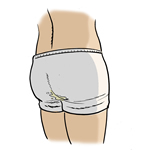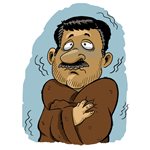Symptoms
 1. Diarrheas 1. Diarrheas
|
| |
 2. Vomiting 2. Vomiting
|
| |
 3. Tiredness 3. Tiredness
|
| |
 4. Νausea 4. Νausea
|
| |
 5. Pain and cramps in the abdomen 5. Pain and cramps in the abdomen
|
| |
 6. Chills 6. Chills
|
| |
 7. Fever 7. Fever
|
The symptoms of gastroenteritis may last from 1 to 10 days. They usually last for 24 – 48 hours.
It is a severe disease for infants, small children, persons with disabilities, persons who cannot attend to their needs and the elderly. In case of many vomiting or diarrheal episodes, a person may require hospitalization for the management of dehydration.
Transmission
 Individuals are usually infected through the consumption of food or beverages prepared by a person with gastroenterirtis when this person does not wash their hands thoroughly after toilet use. Drinking water may also be infected and constitutes a contamination source. Additionally, contact with the feces or vomit of a patient, contact with infected surfaces or objects, as well as the inhalation of infected droplets released in cases of intense diarrhea or vomiting, may lead to the infection of an individual.
Individuals are usually infected through the consumption of food or beverages prepared by a person with gastroenterirtis when this person does not wash their hands thoroughly after toilet use. Drinking water may also be infected and constitutes a contamination source. Additionally, contact with the feces or vomit of a patient, contact with infected surfaces or objects, as well as the inhalation of infected droplets released in cases of intense diarrhea or vomiting, may lead to the infection of an individual.
 In general, the risk of transmission of viral gastroenteritis is larger in cases where there is a large number of people and poor hygiene conditions during the preparation and consumption of food. Examples are: nursery centers, schools, hospitals, houses for the elderly, cruise ships and camps.
In general, the risk of transmission of viral gastroenteritis is larger in cases where there is a large number of people and poor hygiene conditions during the preparation and consumption of food. Examples are: nursery centers, schools, hospitals, houses for the elderly, cruise ships and camps.
Management
There is no specific medicine for viral gastroenteritis. The most important element in its management is the avoidance of loosing too much fluid (dehydration). If symptoms are intense or last for a period larger than 48 hours, seek medical assistance.
When a person has gastroenteritis, i.e. has diarrhea and/or vomiting, for as long as his symptoms persist and for a period of 48 hours following symptoms' remission:
-
He/she should not participate in the preparation of food or in caregiving of other individuals and should limit the immediate contact with his family members
-
He/she should not go to nursery centers or schools (either as a pupil or as an employee) or to his/her work
-
He/she should refrain from going to places such as hospitals, houses for the elderly or other institutions
-
He/she should not take part in activities such as swimming in a pool, going to a spa or team sports
Prevention
Observe hygiene rules
-
Frequent hand wash with soap and water:
-
Following toilet use
-
Following diaper changes
-
Following contact with a person having diarrhea or vomit
-
Before, during and following the handling of food
-
Parents should see to it that their children do the same.
-
Thorough cleaning of surfaces used during preparation of food as well as of appliances, with soap and water, before, during and following preparation of food
-
Use of household chlorine bleach to clean the kitchen and bathroom of the house and thorough cleaning of fabrics contaminated with feces or vomit (clothing, sheets, underwear, towels etc.)
-
Refrain from using the same dishware (glasses, plates, etc.) and other personal items with other persons
-
Refrain from coming in close contact with an individual presenting symptoms of gastroenteritis
Consumption of safe food and water (contaminated food may have normal appearance and smell):
-
Wash food well before consumption and before cooking it
-
Use safe water (of known origin) for drinking as well as for cooking
-
If you suspect that a food may be contaminated, refrain from its consumption
Precautions to take when you travel to high-risk countries:
-
Drink bottled water
-
Use bottled water even for brushing your teeth
-
Refrain from eating raw or not thoroughly cooked food
-
Refrain from consuming food sold in open markets
When to seek medical advice
If the symptoms of gastroenteritis last for a period longer than 24 hours or when the clinical image of a patient is severe, it is recommended to seek the advice of your family doctor.
References
keelpno
 Individuals are usually infected through the consumption of food or beverages prepared by a person with gastroenterirtis when this person does not wash their hands thoroughly after toilet use. Drinking water may also be infected and constitutes a contamination source. Additionally, contact with the feces or vomit of a patient, contact with infected surfaces or objects, as well as the inhalation of infected droplets released in cases of intense diarrhea or vomiting, may lead to the infection of an individual.
Individuals are usually infected through the consumption of food or beverages prepared by a person with gastroenterirtis when this person does not wash their hands thoroughly after toilet use. Drinking water may also be infected and constitutes a contamination source. Additionally, contact with the feces or vomit of a patient, contact with infected surfaces or objects, as well as the inhalation of infected droplets released in cases of intense diarrhea or vomiting, may lead to the infection of an individual. In general, the risk of transmission of viral gastroenteritis is larger in cases where there is a large number of people and poor hygiene conditions during the preparation and consumption of food. Examples are: nursery centers, schools, hospitals, houses for the elderly, cruise ships and camps.
In general, the risk of transmission of viral gastroenteritis is larger in cases where there is a large number of people and poor hygiene conditions during the preparation and consumption of food. Examples are: nursery centers, schools, hospitals, houses for the elderly, cruise ships and camps.













